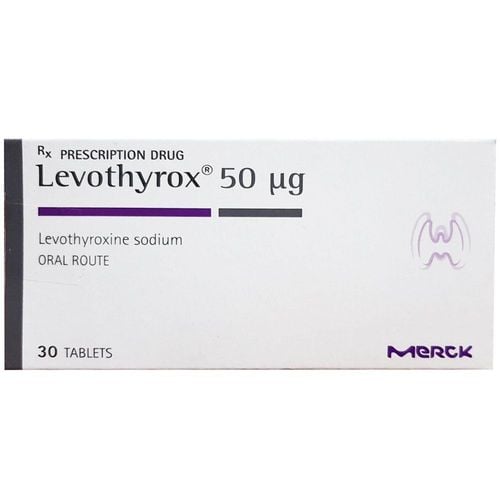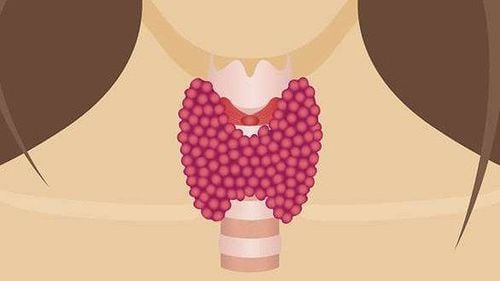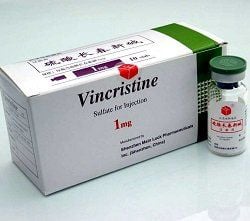This is an automatically translated article.
This article is professionally consulted by Master, Doctor Vu Thi Duyen - Department of Medical Examination & Internal Medicine - Vinmec Hai Phong International General Hospital.Hyperthyroidism is a condition in which the thyroid gland is overactive, leading to the production of thyroid hormones T4 and/or T3 more than normal, which increases circulating hormone levels in the blood, thereby causing tissue damage and metabolism. chemical. Hyperthyroidism is common in women (ratio of 8 women: 1 male) between the ages of 20 and 50 years old. It is common in pregnant women. So when pregnant with hyperthyroidism, vaginal delivery or cesarean section is safe for both mother and baby.
1. Effects of thyroid disease in pregnant women on the fetus
About 3 to 4% of pregnant women have thyroid dysfunction. These disorders can be pre-existing but most often develop after pregnancy. Whether appearing before or after, but if not detected and treated promptly, it can cause dangerous complications for both mother and fetus.
During the first 13 weeks of pregnancy, the fetus does not have a thyroid gland, so the development of the fetus depends entirely on the amount of thyroid hormone provided by the mother through the placenta. This is the period of formation and division of organs. In this period, if there is a lack of hormones, the complications are very serious for both mother and child: The mother may have high blood pressure, heart failure, and the fetus. usually miscarriage, stillbirth, premature birth, placental abruption and especially babies born with cretinism, mental retardation. But the most dangerous is acute hyperthyroidism in labor with a mortality rate of both mother and child up to approximately 100%. That's why all pregnant women should be screened for early detection and timely treatment of hyperthyroidism for pregnant women.
2. Which pregnant women should be screened for thyroid disease?
Screening for the timely detection and treatment of thyroid diseases in pregnant women is extremely important. This helps to prevent complications and reduce mortality in both mother and child, thereby ensuring The children are born perfectly healthy physically and mentally. The following pregnant women should undergo thyroid disease screening and regular monitoring to promptly handle hyperthyroidism:
Pregnant women with pre-diagnosed thyroid disease such as Graves, hypothyroidism, goiter simple thyroid nodule. Pregnant women have a family history, relatives (father, mother, sister...) have thyroid disease. Pregnant women who have had thyroid disease in previous pregnancies. Pregnant women with an obstetric history such as miscarriage, stillbirth, premature delivery, birth with birth defects. Pregnant women with type 1 diabetes. Pregnant women with autoimmune diseases such as rheumatoid arthritis, lupus... all need to be screened for thyroid disease during pregnancy.

Thai phụ bị tiểu đường tuýp 1 nên tầm soát bệnh lý tuyến giáp
3. Having hyperthyroidism should give birth vaginally or by caesarean section?
Hyperthyroidism, especially basedow, should give birth naturally or by cesarean section is a problem that many women who suffer from this disease always wonder and worry.
For women who are being treated for hyperthyroidism but become pregnant or discover hyperthyroidism during pregnancy, the doctor treating hyperthyroidism will consider the mother's blood test and advise on the most suitable way to give birth. If the thyroid hormone test results are normal, it is possible to temporarily stop the drug but continue to monitor, test the thyroid hormone monthly because hyperthyroidism or severe relapse at birth can easily lead to storm. armor level. If severe hyperthyroidism is found, it is necessary to intervene in treatment with synthetic antithyroid drugs (the preferred drug that crosses the placenta is PTU) and close monitoring (test TSH, monthly thyroid hormone) to avoid hypothyroidism in the mother and child.
Pregnant women with Graves' tumor can have a normal delivery depending on the specific condition of each mother and the health of the fetus in the womb. Most cases of basedow may occur in the first 3 months of pregnancy or in women who have had Graves before. In addition to the classic symptoms, the mother may have preterm labor (miscarriage or early cesarean section) or preeclampsia. The mother will have a high risk of heart failure, acute thyrotoxicosis, so the prognosis for a cesarean section (even when the pregnancy is not yet full term) for a mother with Graves' disease is quite high for the purpose of "trying" to preserve the life of the whole mother. mother and son.
However, Graves' disease can improve in the last 3 months of pregnancy or it can also get worse in the postpartum period. Usually, women with Graves' disease after giving birth will get worse (usually in the first 3 months after giving birth), so it is necessary to increase the dose of antithyroid drugs at this time, at the same time, it is necessary to closely control thyroid function. The baby can be breastfed if the mother is treated with PTU because PTU is highly protein bound and passes through breast milk less than other drugs.

Bị cường giáp nên sinh thường hay sinh mổ?
4. Where is the prestigious place for a pregnant woman to check for hyperthyroidism?
Department of Endocrinology - Diabetes at the Department of General Internal Medicine - Vinmec Times City International General Hospital is a reliable address to check for hyperthyroidism for pregnant women.
Endocrinology Department under the field of internal medicine, undertakes examination, diagnosis and treatment, based on disease characteristics - chronic diseases related to dysfunction of the endocrine system and hormones . In particular, how to handle the situation where a pregnant woman with hyperthyroidism gives birth will have professional cooperation and support between an endocrinologist and an obstetrician at Vinmec to ensure safety. highest for mother and baby.
Specializes in applying new techniques in disease treatment: treating benign thyroid nodules with high-frequency ablation (avoiding thyroid surgery for patients). Especially, there is a team of well-trained and experienced medical doctors:
Associate Professor, Doctor, Doctor Nguyen Thi Hoan Associate Professor, Doctorate, Doctor Chu Hoang Van Master, Doctor Pham Thi Thu Huong Master, Doctor Bui Minh Duc Doctor Nguyen Ngoc Son Doctor, Doctor Pham Thi Hong Hoa Master, Doctor Nguyen Thi Cam Tu
Master. Doctor. Vu Thi Duyen has more than 10 years of experience in general medical examination and treatment, especially has strengths in examination and treatment specialized in nephrology - Endocrinology.
The doctor has participated in many domestic and foreign seminars and is currently a Nephrologist - Endocrinology Department of General Internal Medicine, Vinmec Hai Phong International General Hospital.
For detailed advice on the examination and treatment of hyperthyroidism at Vinmec Times City, please contact HOTLINE 0243 9743 556 or register online HERE.














